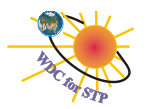|
|
|
Pulsations of the Geomagnetic Field
Geomagnetic pulsations are short-period oscillations of the Earth's magnetic
field in the frequency range from a thousandths of a hertz to several hertz and are characterized by
quasiperiodic structure.
By physical nature, geomagnetic pulsations are hydromagnetic waves,
excited in the magnetosphere of the Earth and in the solar wind. The upper frequency of pulsations is determined by
gyrofrequency of protons in the magnetosphere, on the Earth's surface this corresponds to the frequency
range of about 3-5 Hz.
Geomagnetic pulsations are divided into two classes:
irregular Pi (pulsations irregular) which have the form of separate bursts with a nonstationary spectrum
of several minutes duration,
and continuous Pc (pulsations continuous), lasting several hours with quasi-sinusoidal form and stable regime.
Geomagnetic pulsations Pc1 are quasisinusoidal oscillations with a period
from 0.2 to 5 s, having a characteristic amplitude modulation in the form of separate wave packets,
creating a complex picture of beats. Pulsations Pc1 are sometimes called "pearls", since their
magnetogram resembles a thread of pearl necklace. The duration of the Pc1 series is from
half an hour to several hours, the maximum of their appearance is noted in the early morning hours
local time.
In the Pi1 range, several types of pulsations are observed, in particular IPDP (Intervals of Pulsations
with Diminishing Period).
Generation of these types of pulsations is associated with the development of the magnetosphere substorm.
IPDP pulsations on the Earth's surface are most often observed in the afternoon and evening sectors.
On magnetograms they are visible as a series of individual wave packets, similar to the oscillations of Pc1,
but with a gradually decreasing period, i.e. increasing frequency.
The excitation of IPDP pulsations, like Pc1, is usually associated with the development of ion-cyclotron
resonance in the Earth's magnetosphere.
Catalogues of Geomagnetic Pulsations
1. Matveyeva E.T., Shchepetnov R.V.
Catalogue of geomagnetic pulsations of Pc1 type
on observation data at the Antarctic observatory “Mirny”, 1957 – 1977.
Geophysical Observatory “Borok", Institute of Physics of the Earth RAS, Russia.
2. Matveyeva E.T.
Catalogue of geomagnetic pulsations of Pc1 type
on observation data at the Antarctic observatory “Mirny”, 1979-1989.
Geophysical Observatory “Borok", Institute of Physics of the Earth RAS, Russia.
3. Matveyeva E.T.
Catalogue of geomagnetic pulsations of Pc1 type (perls)
on observation data at the observatory "Borok", 1957-1992.
Geophysical Observatory “Borok", Schmidt Institute of Physics of the Earth RAS, Russia.
4. Matveyeva E.T., Shchepetnov R.V.
Catalogue of geomagnetic pulsations of a type IPDP
(intervals of pulsations with diminishing period)
on the observation data at geophysical observatory “Borok”, 1957-1992.
Geophysical Observatory “Borok", Schmidt Institute of Physics of the Earth RAS, Russia.
|
|
|



